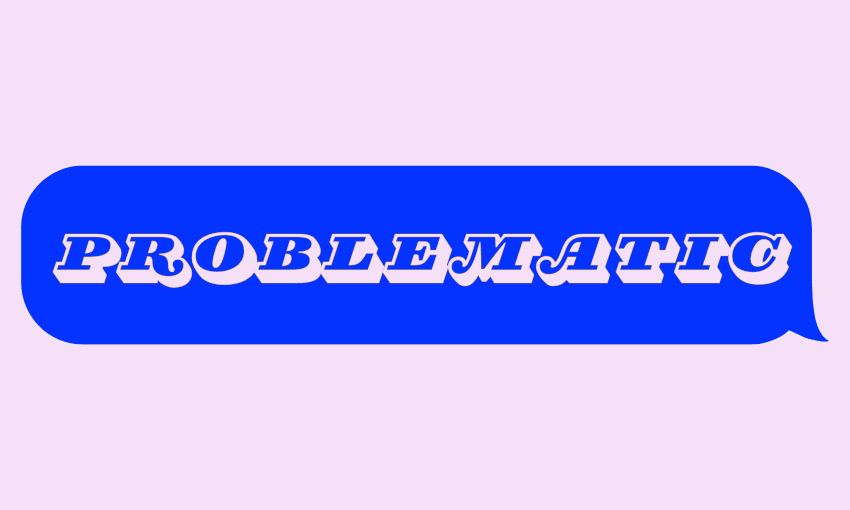It’s clunky, lazy, and reminiscent of the shrillest moment in internet history.
I thought I could sit this one out. “Problematic”, like every other buzzword that sets my teeth on edge, was destined to fade into obscurity – or so I assumed back in the stormy mid 2010s. I could simply bite my tongue and wait the year or so it would take for people to move on to the next braindead internet term.
I’ve been waiting nearly a decade, and it’s only getting more prevalent. Enough.
In case you weren’t around to witness this particular devil spawning, a potted internet history. The term “problematic” was propelled into common usage circa 2015, when the hyper-online social justice left – who were in the process of migrating from their home base, the dying microblogging platform Tumblr, over to Twitter – began an earnest campaign to cancel sexists, racists, sexual abusers and general miscreants and creeps en masse.
It’s hard to believe now that “cancel” has been claimed by the Reality Check Radio right, drenched in semi-ironic opprobrium, but I cannot stress enough how earnestly it was used by online identitarians during this time, eg “PewDiePie is cancelled” and “it’s time to cancel Lena Dunham”, or how rapidly the infractions shifted from intensely serious (raping someone) to laughable (saying “crazy”). And the reason a target would be placed in the crosshairs was invariably articulated using that catch-all term, “problematic”.
Why do I hate this word so much? Let me count the ways. The first level is aesthetic: it’s such a dull, ungainly word, still reeking of its uptight academic roots. Plus, why say “problematic” when there are so many words that actually indicate what the problem is? Aggro, bitchy, cowardly, dominating, evasive, fake, gauche, histrionic… take your pick. Crack open a thesaurus and go nuts. Just please don’t use those clunking four syllables.
The second level on which I hate this word is moral: it’s lazy. If you can’t exactly articulate what your nemesis has done wrong, you need to go back to the drawing board before lobbing a weak “problematic” in his direction. It’s imprecise to the point of dishonesty. Especially during the fervour of Me Too and Black Lives Matter, “problematic” often meant that someone was being accused of holding sexist or racist beliefs, or of committing sexual harassment. But it sometimes meant “guilty of misconduct that doesn’t quite meet the threshold of sexual assault, but is nonetheless creepy”, or even just “someone I can’t stand who deserves to lose their good social standing, but I can’t exactly articulate why”.
It’s the perfect weasel word, because who among us hasn’t caused a few problems? Given the reality of human fallibility, it’s a bulletproof accusation. It’s also totally meaningless.
The third and final level on which I hate this word is visceral: it’s so intimately tied to the worst, most self-righteous people online, during the shrillest moment in internet history, that I can’t help but recoil upon reading it. If you spent the mid 2010s going outdoors rather than scrolling through 140-character moral dictates issued by teenagers, this might sound like a foreign and even implausible universe, but I once saw a woman claim that using “sociopath” as an insult was ableist. Some guy tried to get the concept of “clean privilege” going. I was right there, in the trenches, watching on in mute horror. These people were deranged, and for a brief moment, they remade our culture.
Some of them are, pathetically, still at it, trying to drum up outrage about anodyne celebrities and looking, to quote US writer Freddie de Boer, as though they’re failing to get a pull-cord lawnmower started.
There’s a shooting-fish-in-a-barrel quality to railing against earnest social justice crybullies in 2024, so usually I’d consider it beneath me. But I simply cannot escape their favourite word. As an editor, I receive a handful of pitches and drafts every week peppered with “problematic”, which means that, instead of enjoying my offline old age, I’m routinely flashed back to the Tumblr and Twitter trenches; regularly reminded that I spent the prime of my life reading dweeby polemics about how Florence from Florence and the Machine is a heterosexist.
So, please. All I want for Christmas is to stop seeing this feeble, slithering word. I’ve got enough problems.
